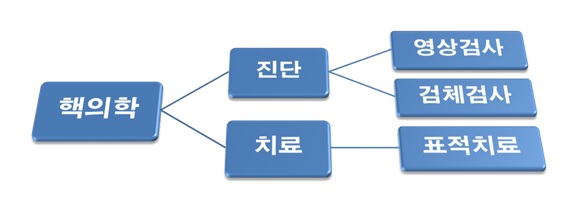
Kangwon National UniversityCollege of Medicine · School of Medicine
Korean
mobile
KNU 
Kangwon National UniversityCollege of Medicine · School of Medicine
user
service
KNU USER SERVICE Main services by user
About
- About
- Departments & Faculty
- Clinical Science
-
Nuclear medicine
- Allergy and Clinical Immunology
- Anatomical pathology
- Anesthesiology and Pain Medicine
- Cardiology
- Critical Care Medicine
- Dermatology
- Emergency
- Endocrinology and Metabolism
- Family Medicine
- Gastroenterology
- Hemato Oncology
- Infectious medicine
- Laboratory Medicine
- Medical education
- Medical informatics
- Nephrology
- Neurology
- Neurosurge
- Nuclear medicine
- Obstetrics and Gynecology
- Ophthalmology
- Orthopedic surgery
- Otorhinolaryngology
- Pediatrics
- Plastic surgery
- Psychiatry
- Pulmonology
- Radiation therapy
- Radiology
- Rehabilitation medicine
- Rheumatology
- Surgery
- Thoracic surgery
- Urology
Nuclear medicine
OVERVIEW
Nuclear medicine is a special field that includes the use of radioactive materials for the diagnosis and treatment of diseases. Planar gamma imaging and single-photon emission computed tomography (SPECT) using radionuclides emitting gamma rays and positron emission tomography (PET) using radionuclides emitting positrons play an important role in non-invasive diagnosis and evaluation of treatment response in various diseases. Radioactive isotopes are also used in blood samples to perform quantitative tests for antigens and antibodies, including various cancer markers, and are used in various ways to diagnose and evaluate diseases.

- 핵의학
- 진단
- 영상검사
- 검체검사
- 치료
- 표적치료
- 진단
In addition, nuclear medicine began to be introduced into medicine as an approach that enables diagnosis and treatment simultaneously (“theragnosis”) in the thyroid disease in the early days. By irradiating only, the target to be treated with radiation while minimizing damage to normal tissues, the range of therapeutic roles is now gradually expanding as targeted therapy, which enables selective treatment, is being introduced.
Currently, the Department of Nuclear Medicine, Kangwon National University College of Medicine, and Graduate School of Medicine, mainly promotes and plan various clinical studies based on imaging tests and cooperative research with other interdisciplinary fields.